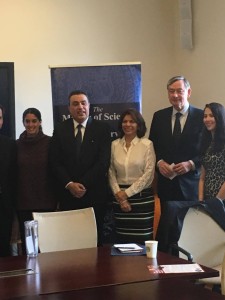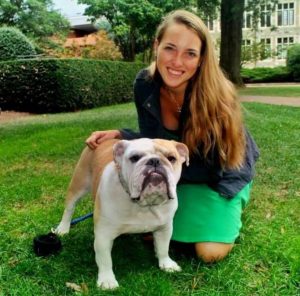Lessons from Leadership: A Conversation with Former Heads of State
 Georgetown’s Institute of Politics and Public Service hosted a discussion with three former heads of government: current GU Politics Fellow and former President of Costa Rica (2010-2014) Laura Chinchilla, former President of Slovenia (2007-2012) Danilo Türk, and former Prime Minister of Tunisia (2014-2015) Mehdi Jomaa on March 3. Clem McCartney, who serves as the Shared Societies Project Policy and Content Coordinator at the Club of Madrid, an international network of democratically elected presidents and prime ministers moderated the event.
Each participant began by discussing lessons from leadership. President Türk (Slovenia) explained the differences between the academic world and politics. “In research and teaching, we work with analytics of the present, while in politics we have to create facts as they will be because we are the ones making the decisions.” President Chinchilla (Costa Rica) pointed out the difficulties of the “less bad decision.” He emphasized that leaders must be cognizant of their principles and convictions when making difficult decisions. President Jomaa (Tunisia) focused on inclusion in politics. “Leaders need a clear vision detailed in strategy and action for their country and dedicated to inclusion...it is important to be open to everyone, but also important to be a leader and make a decision in the end.” Moreover, Jomaa encouraged young leaders to explore both political and corporate sectors to better understand problems.
Georgetown’s Institute of Politics and Public Service hosted a discussion with three former heads of government: current GU Politics Fellow and former President of Costa Rica (2010-2014) Laura Chinchilla, former President of Slovenia (2007-2012) Danilo Türk, and former Prime Minister of Tunisia (2014-2015) Mehdi Jomaa on March 3. Clem McCartney, who serves as the Shared Societies Project Policy and Content Coordinator at the Club of Madrid, an international network of democratically elected presidents and prime ministers moderated the event.
Each participant began by discussing lessons from leadership. President Türk (Slovenia) explained the differences between the academic world and politics. “In research and teaching, we work with analytics of the present, while in politics we have to create facts as they will be because we are the ones making the decisions.” President Chinchilla (Costa Rica) pointed out the difficulties of the “less bad decision.” He emphasized that leaders must be cognizant of their principles and convictions when making difficult decisions. President Jomaa (Tunisia) focused on inclusion in politics. “Leaders need a clear vision detailed in strategy and action for their country and dedicated to inclusion...it is important to be open to everyone, but also important to be a leader and make a decision in the end.” Moreover, Jomaa encouraged young leaders to explore both political and corporate sectors to better understand problems.
The participants also exchanged ideas concerning the challenges facing their countries. Türk touched on the current refugee crisis and commented on how the “fear of the unknown” prevents inclusive politics. Chinchilla discussed how Costa Rican leaders must balance security and freedom when tackling organized crime. She attributed Costa Rica’s success to investment in human development, organization of respected laws, and prevention of conflict between citizens and police. Additionally, Jomaa pointed to Tunisia as an example that signifies the importance of threat resilience and the fight against extremism.
Overall, the participants shared a decision making process informed by both their own beliefs and those of their citizens. During their time as heads of state, they balanced strong leadership with democratic inclusion in order to ensure stability. Despite differences in culture and politics, these three leaders provided advice that apply to challenges democratically-elected leaders face worldwide.
 Christina is an International Politics, Security major and Spanish minor in the School of Foreign Service. She follows an absurd amount of dog Instagram accounts and hopes to one day attend the Golden Retriever Festival in Scotland.
Christina is an International Politics, Security major and Spanish minor in the School of Foreign Service. She follows an absurd amount of dog Instagram accounts and hopes to one day attend the Golden Retriever Festival in Scotland.
